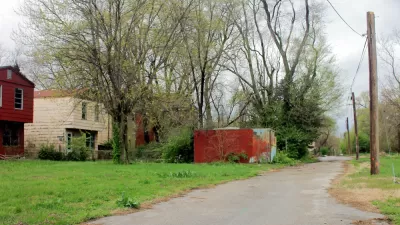The Great Recession and its aftermath have taken a toll on most Americans, but as a new report from Pew’s Economic Mobility Project shows, it's been far worse for those that can least afford it.
Richard Florida examines the findings of the new report, titled "Weathering the Great Recession," which examines how the Great Recession has effected those living in high-
versus low-poverty neighborhoods. As Florida notes, the report's central finding is that, "while 'the Great Recession had devastating impacts
for families at every rung of the economic ladder,' it hit especially
hard at families in high-poverty neighborhoods already 'experiencing
hard times before the recession hit, making any additional losses that
much more harmful to their economic prospects.'"
Just how much did the recession diminish the household wealth of those living in such neighborhoods? "While families in low-poverty neighborhoods lost more absolute wealth as a
result of the Great Recession - $135,281 compared to $29,778 for
high-poverty neighborhoods...These losses to high-poverty translated into a staggering 91 percent of
their overall wealth compared to 47 percent for families in low-poverty
neighborhoods...," writes Florida.
Meanwhile, as the AP reported this week, new Census numbers indicate that America's poor population continues to increase (now 49.7 million or 16.1% of the population, based on a new measure of poverty), despite the recovering economy.
FULL STORY: The Great Recession's Devastating Toll on Disadvantaged Neighborhoods

Maui's Vacation Rental Debate Turns Ugly
Verbal attacks, misinformation campaigns and fistfights plague a high-stakes debate to convert thousands of vacation rentals into long-term housing.

Planetizen Federal Action Tracker
A weekly monitor of how Trump’s orders and actions are impacting planners and planning in America.

In Urban Planning, AI Prompting Could be the New Design Thinking
Creativity has long been key to great urban design. What if we see AI as our new creative partner?

King County Supportive Housing Program Offers Hope for Unhoused Residents
The county is taking a ‘Housing First’ approach that prioritizes getting people into housing, then offering wraparound supportive services.

Researchers Use AI to Get Clearer Picture of US Housing
Analysts are using artificial intelligence to supercharge their research by allowing them to comb through data faster. Though these AI tools can be error prone, they save time and housing researchers are optimistic about the future.

Making Shared Micromobility More Inclusive
Cities and shared mobility system operators can do more to include people with disabilities in planning and operations, per a new report.
Urban Design for Planners 1: Software Tools
This six-course series explores essential urban design concepts using open source software and equips planners with the tools they need to participate fully in the urban design process.
Planning for Universal Design
Learn the tools for implementing Universal Design in planning regulations.
planning NEXT
Appalachian Highlands Housing Partners
Mpact (founded as Rail~Volution)
City of Camden Redevelopment Agency
City of Astoria
City of Portland
City of Laramie




























